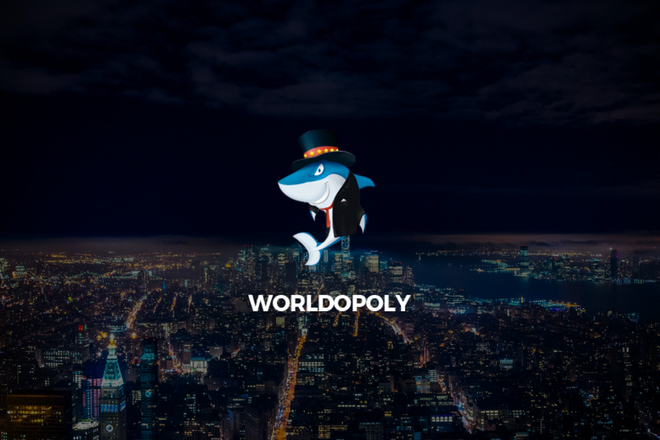Have you ever wanted to be a real estate mogul? Hold on to your top hat and monocle, because here comes the next best thing.
Worldopoly, a new mobile game built on the blockchain, is a real-time, strategic world-building game, in which you can “buy” streets (viewed over Google Maps) and build simulated, augmented reality properties on them. You can then customize your own real estate empire by buying other players’ properties and engaging in some healthy, free-market competition to customize your world and make real money doing it.
Sound intriguing?
Read on.
What is Worldopoly and Who is it For?
Gameplay does not require any special skills or economic know-how, so it can be enjoyed by anyone. The game involves diverse and surprising elements, and should prove of interest to aficionados of games of all different genres.
However, there is more that sets Worldopoly apart from other mobile games, placing it at the cutting edge of 2018’s mobile applications. Worldopoly combines three of the most talked-about technologies of the year – geopositioning, augmented reality, and blockchain. Each provides an active and organic contribution to the game’s progression.
With player interaction and the very concept of the game fueled by these revolutionary technologies, Worldopoly promises to be a dynamic and exciting gaming experience the likes of which we have not been seen before. And the team of talented developers have high hopes of further development and supplementation, with plans to expand game world perception systematically.
But let’s take a look at the game model that Worldopoly uses, and at the hot topic technologies that directly influence its design.
Geopositioning and Augmented Reality in Worldopoly
The game of Worldopoly is set in a virtual city, complete with streets, signs, and landscapes. As in the real world, players can buy and sell properties, and construct and enhance buildings on them.
However, where this differs from other virtual world-building games (say, The Sims or Minecraft) is that Worldopoly uses geopositioning technology through Google Maps to let players build their real estate empires from the streets and buildings that actually exist – while walking through them in real time.
Worldopoly’s unique use of augmented reality (AR) through geopositioning allows gameplay to be synchronized with the real world – so you could walk down the very street you “own” in the game , while it is simultaneously displayed on your mobile device. This gives the gameplay a much more personal, meaningful touch than just another standard fantasy virtual space would.
Experts in the AR field predict it could rake in $85 to 90 billion of revenue in the next 5 years, and as more people become aware of it, AR will become more and more prevalent in the entertainment and production industries. Through early adoption and seamless application of this in-demand technology, Worldopoly is safeguarding its position ahead of the curve to ensure that it will be one of the most engaging and immersive gaming platforms out there.
Blockchain and Worldopoly
And, of course, what mobile platform would dare call itself “innovative” in this day and age if it didn’t utilize blockchain?
While plenty of mobile games have already jumped on the bandwagon, in many cases that’s all it is – a savvy application of a trend for PR purposes, in which blockchain is little more than an in-game tool, or a means of paying for the game through cryptocurrencies.
However, in Worldopoly’s case, the Ethereum blockchain and the local cryptocurrency (known as the Worldopoly Token, or WPT) are integral to the very ecosystem of the game.
The economic system of Worldopoly is fueled by WPT, which players receive and can use to pay for the game’s internal services. There will also be coins to be used exclusively in-game, as well as building resource currencies. But where WPT differs is that in the future, players will be able to withdraw it for free to use in the real world. So not only will players be able to potentially monetize their game-time, but they’ll be learning about the principles of blockchain technology to boot.
And, of course, after cryptocurrencies across the board saw unprecedented growth in value last year, blockchain is the word on everyone’s lips this year. Consequently, any platform able to display skills and knowledge in the blockchain field – particularly if it’s done in an organic, gamified way – will be in high demand in the coming years.
And that demand shows no sign of waning any time soon. As we surf the wave of cryptocurrency startups and ICOs, big players such as institutional investors and world financial organizations are finally starting to test the waters. As they become more confident investing in the technology, new investors will follow. Morgan Stanley reported that hedge funds invested $2 billion in cryptocurrency projects in 2017, a clear sign that the floodgates have opened and there is much more to come.
As we have seen with Ethereum’s Crypto Kitties phenomenon, blockchain combined with gaming platforms is a combination that tends to do extraordinarily well. Blockchain is one of the most robust technologies out there; it has already revolutionized operations with digital data worldwide, and there is a lot more in store.
With Worldopoly getting in on the ground floor of one of tech’s most exciting disruptions, they’re confident in their staying power and their ability to teach their players about the wonderful world of crypto – and they’ll be having fun at the same time!

